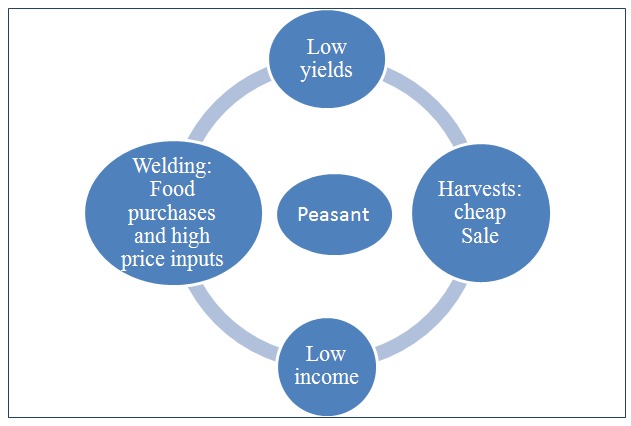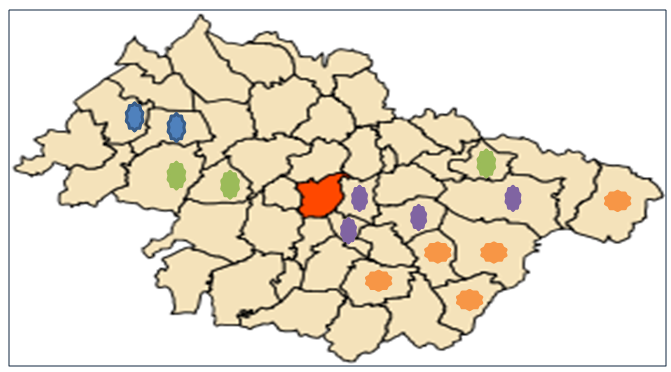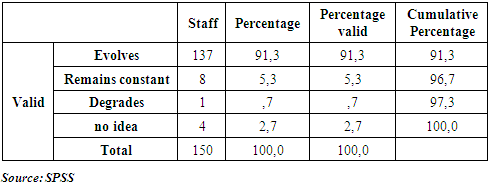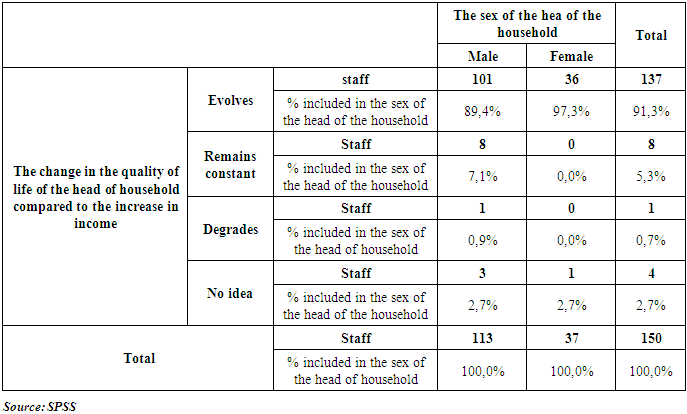-
Paper Information
- Previous Paper
- Paper Submission
-
Journal Information
- About This Journal
- Editorial Board
- Current Issue
- Archive
- Author Guidelines
- Contact Us
International Journal of Inspiration & Resilience Economy
2020; 4(2): 80-86
doi:10.5923/j.ijire.20200402.05

Contribution of Income to the Improvement of Subjective Well-being in the Rural World in Algeria (Case of the Province of Mascara)
Elagag Mustapha, Berrefes Imene
University of Tlemcen, Algérie
Correspondence to: Elagag Mustapha, University of Tlemcen, Algérie.
| Email: |  |
Copyright © 2020 The Author(s). Published by Scientific & Academic Publishing.
This work is licensed under the Creative Commons Attribution International License (CC BY).
http://creativecommons.org/licenses/by/4.0/

The relationship between income and happiness is one of the most significant questions of literature based on subjective well-being. The traditional idea of economists is to think that to have more happiness in society, it is necessary to produce more wealth that means to increase material wealth. This study proposes to explore how the income factor contributes to the improvement of the subjective well-being of individuals in the rural world. This study is initiated by the theoretical foundations of subjective well-being and the basic concepts; Then experiments and research on subjective well-being in the rural world follow each other, while complementing the research with an empirical study (survey), which describes the history and overall situation of rural households in a well Determined and detailed of all the components (civil servant, shepherd, etc.) with their well-being in Algeria.
Keywords: Subjective Well-being, Economy of Happiness, Quality of Life, Rural World, Algeria, Study of Proximity
Cite this paper: Elagag Mustapha, Berrefes Imene, Contribution of Income to the Improvement of Subjective Well-being in the Rural World in Algeria (Case of the Province of Mascara), International Journal of Inspiration & Resilience Economy, Vol. 4 No. 2, 2020, pp. 80-86. doi: 10.5923/j.ijire.20200402.05.
Article Outline
1. Introduction
- The economy has long appealed to individual utility, or well-being, as the ultimate motivation behind the actions of a person. International organizations focus and care about the happiness of individuals, knowing that the latter (happiness) is often used as a synonym for subjective well-being as confirmed by economists Frey and Stutzer. The positive relationship between income and individual use partly explains the dominant role of income growth (generally measured by gross domestic product) in improving welfare in public debates.Well-being remains a multidisciplinary topical topic that has been approached by psychologists, philosophers, sociologists and even economists. "Quality of life"1 research encompasses all economic and social studies of the wellness theme with the highest level of income or consumption. In the traditional time, economists think that more wealth equals more well-being that means more happiness. The latter (happiness) is currently something important in the lives of individuals. Many studies have been developed on the subject with very diverse issues. Subjective well-being was the centre of several global urban and rural researches, knowing that our study focuses on rural which is designated as the set of inhabited cultivated spaces of a small population, its concepts are all the Contrary to the city or urban environment; Many essays and theological literatures have been interested in this thorny subject. The objective of this study is to analyse how the income factor contributes to the improvement of the subjective well-being of rural households knowing that they find it too difficult in providing for their basic needs with the lack of work that is spreading in the First paying rural area of income.The methodological approach used is arranged in the following way: The theoretical foundations on the subject of subjective well-being and the basic concepts to better conceive the problem. As a result, the relationship between income and SWB followed by experiments and research carried out on subjective well-being in the rural world. Lastly, a survey that has been developed whose purpose is to describe the situation of rural households in Algeria, we have chosen to do a study of proximity in a well-defined and detailed area of all the components (official, shepherd, etc.) with Their well-being in the Province of Mascara to value our research.
2. Literature Review
2.1. Definition of Quality of Life
- The quality of life study seeks to define what a good life is and how reality fits with the selected criteria or standards. Its aim is to define ways to achieve a better life.The term "quality of life" includes two senses: the first is the existence of conditions deemed indispensable for a good life that applies at the societal level. When the quality of life in a region is poor, it means that the essential conditions are lacking: food, health care and adequate housing. In other words, the region is not "livable-with" for its inhabitants. The second is the practice of good life. The latter does not adapt to the societal level. A region lives well is an incorrect expression, only its inhabitants live. On the other hand, both senses adapt to the individual level. When a person does not have a good life, it means that he misses essential things. For example, an individual can be rich, powerful and popular, but he can be troubled and suffering. On the other hand, a person who is needy, who has no power and isolated from society can nevertheless feel good mentally and physically. These variables are referred to as "presumed" quality of life and "apparent" quality of life. According to Veenhoven, Happiness is one of the indicators of the apparent quality of life2. This requires defining precisely the "presumed" and "apparent" quality of life.a. Presumed quality of life: Generally, quality of life is estimated in a country by taking stock of the parameters in political news, which contribute to making life better, such as economic prosperity, full employment and education. The measures of these parameters are met in the Human Development index (HDI) or the Social Progress Index (ISP). These indices serve as indicators to advance on the selected track, but they do not show whether this is the way to the right path, in other words, whether these political executions lead to the improvement of the lives of the inhabitants3. b. Apparent quality of life: This approach involves evaluating the degree of development of individuals in a society. It (the approach) focuses on the effects of a life rather than on its conditions. The duration of an organism's existence plays a particular role in the degree of development. To illustrate this fact, Veenhoven explains that in higher animals, the affective experience helps to reveal the blossoming. When the animal finds the right shelter, he will feel good and will stay in the same environment. Otherwise he will be dissatisfied and seek a more suitable environment or wither away. On the human side, he has the ability to assess his degree of satisfaction over a longer duration and his reasoning allows him to determine if the situation could have been better than it was. This means that when the inhabitants of a region are happy, this region is a place where it is apparently good to live, even if the pretended conditions of a pleasant life are not fully met there4.
2.2. Definition of Subjective Well-being
- According to the OECD, «the notion of subjective well-being reflects the idea that quality of life depends on the impact of a set of specific circumstances on the feelings of individuals of their own existence, and presupposes that the person best placed to Judging the quality of a life is the person himself»5.Yamamoto believes that subjective well-being is based on the needs that are the universal conditions for human functioning and that play a large role on the SWB6.We conclude that SWB can be defined as the satisfaction process which must take into account personal, cultural and contextual conditions.I. History of the theory of subjective well-being:The economy of Happiness is a branch that emerges from the economy and bases its analyses on subjective well-being (happiness) not on objective well-being, which differentiates it from the economy of well-being. As Lucie Davoine confirms in her report, can the economy of happiness renew the economy of well-being?: « The branch of the economy that studies subjective well-being now takes the name of the economy of happiness which should not be confused with The welfare economy »7. And to go to the front of the search; Let us take the perception of economists Frey and Stutzer who is quoted by Carlo Klein and Monique Borsenberger, that subjective well-being, happiness and satisfaction are considered synonymous8. An ancient philosophical thought considers that it is the individuals themselves who are in the best position to judge their own situation. Only in economics, this approach is closely linked to the utilitarian tradition which is with the idea that the quality of life is indicated only in the subjective situations of each. For a human existence there is a common goal to give everyone the opportunity to be "happy" and "satisfied" in life9. In the traditional time, economists think that more wealth equals more well-being that means more happiness. According to Davoine quoted by Gaucher, right now, the economy of happiness is a fundamentally experimental approach seeking to "measure happiness and estimate the determinants of declared satisfaction or well-being"10.II. The relationship between income and subjective well-being:According to the study conducted by Diener et Al quoted by Renaud Gaucher, who covered 55 countries on the relationship between happiness and income; It appears that individuals living in rich countries are on average happier than people living in poor countries, and this is seen in relation to democracy, respect for human rights and less inequality in rich countries. Nevertheless, there are individuals living in poor countries who have almost the same level of happiness as those living in rich countries. And we notice that when there is an increase in income happiness increases if the old income was low; And from a certain threshold, happiness does not increase with an increase in income. This threshold changes, according to the researchers, as Frey and Stutzer estimated 10 000$ US, except that the yard estimates 20 000$ US, this estimate is not important, it is the idea of the threshold that is important: letting see that happiness and income are Correlated up to a certain threshold, after they are not or poorly correlated11. And by this left-handed observation, "We must minimize poverty and not seek to maximize wealth, i.e. maximizing growth"12 so that individuals are happy.According to Andrew E. Clark and Claudia Senik13, the relationship between income and happiness is one of the most significant questions. This relationship was the centre of extensive interest in the years 1970. There is now a consensus on the empirical relationship between income and life satisfaction on a cross-sectional basis at both the individual and national levels. According to Sacks, Stevenson and Wolfers quoted by Boarini R, Comola M, Smith C, Manchin R, and Keulenaer F, a high income is associated with a higher level of life satisfaction, but with declining returns as income increases. For example, the latter (sacks, Stevenson and wolfers) have found a constant relationship both at the individual and national level, where a doubling of income is associated with an increase of 0.3 points in life satisfaction on a scale from 0 to 10.The static relationship between income and life satisfaction is relatively clear, as is the dynamic relationship at the individual level. According to Gardenerer and Oswald, Di Tella, Haisken-De New, and MacCulloch quoted by Boarini R, Comola M, Smith C, Manchin R, and Keulenaer F, there is data from the panel suggesting that an increase in an individual's income results in an increase in the Life satisfaction. However, the evidence at the global level is more ambiguous, with different views as to whether the evidence supports the increase in life satisfaction in accordance with the follow-up of GDP per capita as suggested by sacks, Stevenson and Wolfers, quoted by Boarini R, Comola M, Smith C, Manchin R, and Keulenaer F, or not as Judge Easterlin and Angelescu quoted by the same authors. What is interesting is that although there is no agreement on the fact that if the average income increases will increase the mean of life satisfaction for a country as a whole. The "Log-linear"14 nature of the relationship between income and life satisfaction is generally agreed upon; On the other hand, this implies that: for all other things being equal, an increase in the inequality of income distribution in a country should be associated with a decrease in the average life satisfaction levels15.
2.3. Literature Review on Subjective Well-being in the Rural World
2.3.1. Experience of the Influence of Warranting on the Well-being of Rural Households in Burkina Faso
- When there is an excess of supply on the crop, farmers who need money give up their production at the first come at a low price, while the need to acquire some needs to start a new agricultural season or to acquire food that require the use of the market to obtain seed and high-priced family needs, because there is an excess of demand.
 | Figure 1. The Vicious circle leading to warranting (Source: http://www.unctad.info/upload/SUC/MaliGumArabicWorkshop/SaniMahamadouPresentatio n.pdf.) |
3. Empirical Study
3.1. Study of "Subjective Wellbeing and Income: Empirical Patterns in the Rural Developing World":18
- In this study, the authors use a large sample of people in rural areas of developing countries with relatively low income levels to test whether subjective well-being has a growing function of absolute income in our Sample, and analyze the existence of adaptation and social comparison. The sample includes 6.973 rural households in 23 countries across Asia, Africa and Latin America. On an average of (1-5); 49,% of respondents reported a subjective level of well-being (4 or 5). 6% of respondents reported being very unhappy with their lives, while 5% reported being very satisfied. 86.1% of Latin America and 61.4% of Asian respondents were above the midpoint (3), the share was lower in Africa (43.3%), where 8% reported being very dissatisfied with their lives. 40.1% of respondents consider their household to be better at Time of maintenance compared to the previous 5 years, 34.9% saw no difference, and 25% were in a worse situation. The proportion of households with improved status was greater in Latin America (60.8%) than in Asia (40.7%) and Africa (35.0%).
3.2. Study of "Does Relative Income Matter for the Very Poor?" Evidence from Rural Ethiopia:19
- This research examines the impact of income on subjective well-being among extremely poor people. The authors tested this hypothesis on people living in rural areas of northern Ethiopia, which is one of the poorest regions in the world. They found that the impact of relative income on subjective well-being is of small insignificant magnitude. This result leads to many important implications in the development research, particularly in the reduction of poverty and income inequality, and the conception of redistribution policies.
4. Case Study
- Contribution of income to the improvement of subjective well-being among rural households
4.1. Search Field
- The Province of Mascara is part of the mountains of Beni Chougrane, it is located in the northwestern region of Algeria. According to Scott Zahira and Berghmans Omar, the Province of Mascara "recorded a rurality rate of 70% (32 rural communes on 46), a rate above the national average"20.The data are from a survey of rural households in 14 communes in Mascara Province between January and October 2015. Two in Zone 1 (the GIS and Habra Plains in the north) selected by a blue star, three in zone 2 (the mounts of Beni Chograne upstream) selected by a green star, four in zone 3 (the High Plains in the centre) selected by a purple star Cinqdans Zone 4 (the mountains of Saida to the south) selected by an orange star. In some municipalities that have urban characteristics, we have selected some villages to represent these communes. We wanted to reach 250 questionnaires but we reached only 150 households, because we had difficulties with the heads of the household, especially with women (compared to conservatism).
4.2. Structure of the Questionnaire
- The contents of the questionnaire can be divided into five categories of information: ο The first category: sociodemographic characteristics of the head of household.ο The second category: Standard of living.ο The third category: Quality of life. ο The fourth category: Indicators of possession of property.ο The fifth category: Subjective well-being.
4.3. Definition of the Purpose of the Investigation
- We conducted a questionnaire survey to analyze how the income factor contributes to the improvement of subjective well-being among rural households in Algeria, it addressed the determinants of living standards, quality of life and Subjective well-being of the target population.
4.4. Selection of Population and Sample
- We chose the random sampling method to give the population an equal opportunity to participate in our survey. A sample of 150 households was retained (men, women, with/without children with charges, with/without income...).
4.5. Conduct of the Survey
- With regard to the method of administration of the questionnaire, we have the task of noting the answers provided by the subjects, in order to facilitate their work (some people do not understand the French language) More not to lose the questionnaires knowing that we have no relationship with the subjects. Data processing was done by the ' SPSS ' software version 20.
4.6. Descriptive Analysis
- The objective of this study is to compile a quantified portrait of the characteristics of survey respondents residing in Mascara province. The questionnaire was to be completed by the person who is the main financial support of the household (Head of household). Moreover, if there were several individuals who were financially supportive of the household, the older individual had to complete the questionnaire.a. The sex of the head of the household as in Table (1) below
|
|
4.7. In-Depth Analysis
- Relationship between "the change in the quality of life of the head of the household in relation to the increase in the income and sex of the head of household" as in Table (3) below
|
5. Conclusions
- The pursuit of happiness is the ultimate goal of every being on earth, where every human has his own vision of happiness which led us to the reflection and the elaboration of this modest work. Following the analysis of the data, the study reveals that the subjective well-being of rural households in Mascara province is correlated with the level of income, which means that the more household income increases, the more their subjective well-being believes; This leads us to infer that income is the culmination of subjective well-being among our respondents. This result calls into question the economic theory of Frey & Stutzer which stresses that the increase in the wealth of developed States has not allowed to increase happiness. On the other side of developing countries such as Algeria, the increase in wealth plays a key role in subjective well-being.
Notes
- 1. Veenhoven, R. (1997). Progrès dans la compréhension du bonheur. Revue québécoise de psychologie, 18, p 29.2. Veenhoven, R. (1997), Op.cit. p 30.3. Veenhoven, R. (2012). La satisfaction à l’ égard de la vie en comparaison internationale. Sécurité Sociale CHSS, 9, p 298.4. Veenhoven, R. (2012). Op.cit. p 298.5. OCDE, (2011), Comment va la vie?: Mesurer le bien-être, Éditions OCDE, p 291.6. Yamamoto, J., Feijoo, A. R., & Lazarte, A. (2008). Subjective wellbeing: An alternative approach. Wellbeing and development in Peru: Local and universal views confronted, p 63.7. Centre d'études de l'emploi (France). (2007). L'économie du bonheur peut-elle renouveler l'économie du bien-être? L. Davoine (Ed.). Centre d'études de l'emploi, p 05.8. Carlo Klein et Monique Borsenberger, AICESIS Cour des comptes européenne, (11-15 juillet 2010).9. Extrait du rapport de la CMPEPS (Rapport de la Commission sur la mesure des performances économiques et du progrès social); mis au format html le 21/09/2009 par Pierre Ratcliffe.10. Gaucher, R. (2014), Bonheur au travail et performance financière: de l’étude quantitative de la relation au modèle prédictif, p 05.11. Gaucher, R. (2009). Bonheur et économie: le capitalisme est-il soluble dans la recherche du bonheur? Editions L'Harmattan, Pp 37- 38.12. Gaucher, R. (2009), Op.cit. p 38.13. Clark, A. E., & Senik, C. (2011). La croissance du PIB rendra-t-elle les habitants des pays en développement plus heureux? Revue d'économie du développement, 19(2), p 117.14. According to the Gallup World Poll, a log-linear relationship between income and subjective well-being at the individual level implies, as a mathematical necessity point which, on average, an additional dollar of income has a more positive impact on the well-being Subjective for a person with a low income, compared to one with a higher income. Thus, the increase in inequalities (through the transfer of income from a person with less than one income with a higher income) will decrease the average levels of overall subjective well-being. This result is a direct function of the logarithmic form of the functional relationship between well-being and subjective income. 15. Boarini, R., Comola, M., Smith, C., Manchin, R., & De Keulenaer, F. (2012). What makes for a better life?: The determinants of subjective well-being in OECD Countries–Evidence from the Gallup World Poll (No. 2012/3). OECD Publishing, p 10.16. Laura Pala, (2012). L’impact du Warrantage: tentative d’évaluation sur le bien être socio-économique des ménages bénéficiaires des provinces du Tuy et Ioba, Burkina Faso, p 07.17. Laura Pala, (2012), Op.cit., p 08. 18. Reyes-García, V., Babigumira, R., Pyhälä, A., Wunder, S., Zorondo-Rodríguez, F., & Angelsen, A. (2015). Subjective wellbeing and income: empirical patterns in the rural developing world. Journal of Happiness Studies, 1-19.19. Akay, A., & Martinsson, P. (2011). Does relative income matter for the very poor? Evidence from rural Ethiopia. Economics Letters, 110(3), 213-215.20. Souidi, Z., & Bessaoud, O. (2011). Valorisation des espaces ruraux en Algérie: une nouvelle stratégie participative. New Medit, p 18.
 Abstract
Abstract Reference
Reference Full-Text PDF
Full-Text PDF Full-text HTML
Full-text HTML


